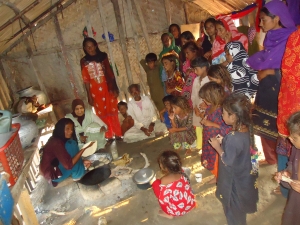Addressing women's 'double burden' with alternative fuel sources
Location: Mirpur Sakro, Thatta, Sindh, Pakistan. 2nd Jul 2015
Water-logging and salinity had rendered the surrounding agricultural land in Mirpur Sakro useless, leading to heavy dependence on mangrove forests for fuel wood and as grounds for fodder for livestock. This leads to higher levels of air pollution as well as creates major health risks such as respiratory diseases for the villagers.
Based on traditional gender roles of women pre-dominantly carrying out household related tasks, the women of Mirpur Sakro spend between two to five hours daily collecting wood for fuel from mangrove forests. This increases the ‘double burden’ of women where they would not only share the workload with men in the productive sphere for income generation, but they would also have an extra responsibility for domestic unpaid labor.
The small grant project under Mangroves for the Future with the implementing partner Women Development Association (WDA) aimed to address these issues by introducing biogas as a cleaner source of energy than wood, which also minimized health risks. This would also mean that women would have more time to engage in other activities that did not include strenuous unpaid labor.
The MFF project constructed four biogas plants in the locality, which are already used by households in the village. In addition, 5,500 mangrove saplings were planted by the community in an effort to conserve the existing mangrove forest.
Identifying alternative fuel sources saves women's labor and time, thus creating space for women to engage in other activities such as generating income, community leadership, caring for family and looking after their own health. This in turn gives women a greater sense of personal and economic empowerment.
Read more about the "Conservation and women empowerment" MFF Pakistan project.

Conservation and Women Empowerment